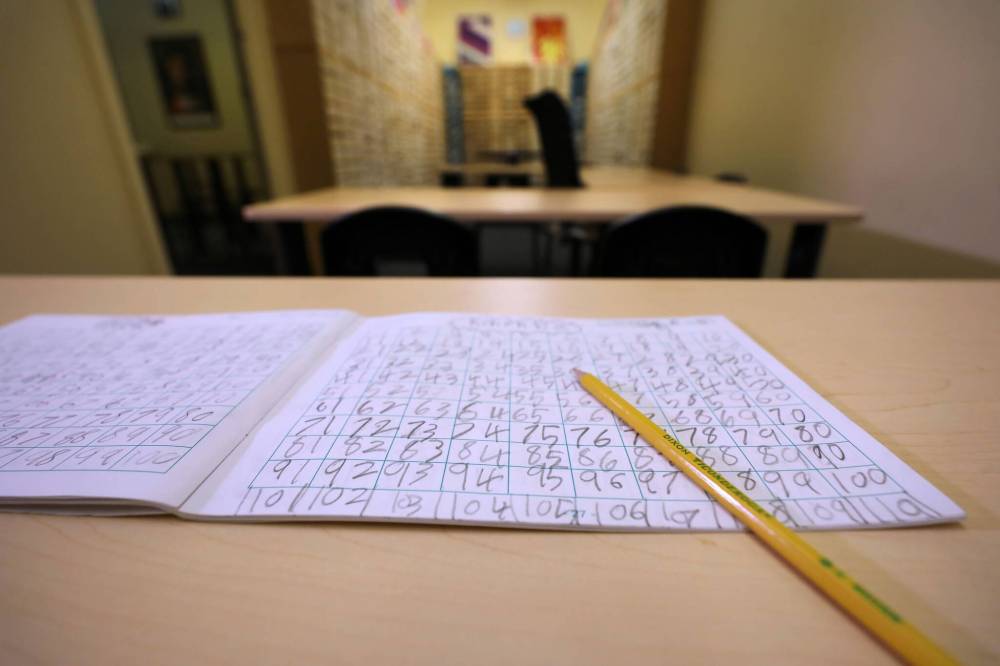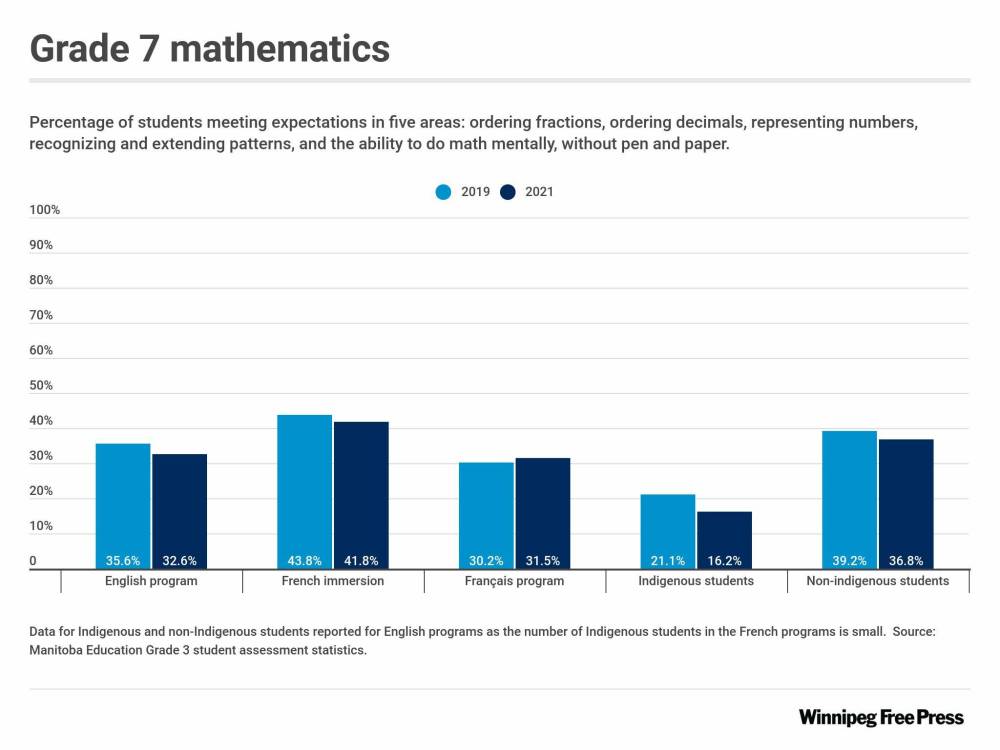French, immersion learners take hit in math, reading
Advertisement
Read this article for free:
or
Already have an account? Log in here »
To continue reading, please subscribe:
Monthly Digital Subscription
$0 for the first 4 weeks*
- Enjoy unlimited reading on winnipegfreepress.com
- Read the E-Edition, our digital replica newspaper
- Access News Break, our award-winning app
- Play interactive puzzles
*No charge for 4 weeks then price increases to the regular rate of $19.00 plus GST every four weeks. Offer available to new and qualified returning subscribers only. Cancel any time.
Monthly Digital Subscription
$4.75/week*
- Enjoy unlimited reading on winnipegfreepress.com
- Read the E-Edition, our digital replica newspaper
- Access News Break, our award-winning app
- Play interactive puzzles
*Billed as $19 plus GST every four weeks. Cancel any time.
To continue reading, please subscribe:
Add Free Press access to your Brandon Sun subscription for only an additional
$1 for the first 4 weeks*
*Your next subscription payment will increase by $1.00 and you will be charged $16.99 plus GST for four weeks. After four weeks, your payment will increase to $23.99 plus GST every four weeks.
Read unlimited articles for free today:
or
Already have an account? Log in here »
Hey there, time traveller!
This article was published 17/08/2022 (1208 days ago), so information in it may no longer be current.
The limits of immersive language instruction throughout the COVID-19 pandemic appear to be behind Manitoba’s latest achievement data, given scores show drops in the number of français and French immersion students meeting grade-level expectations in math and reading.
The provincial government has posted the latest results of its standardized evaluations in Grade 3 (numeracy and literacy), Grade 4 (French immersion), Grade 7 (mathematics) and Grade 8 (literacy).
The tests, in addition to Grade 12 provincial exams, were paused early in the pandemic to alleviate stress on students and teachers alike. The elementary and junior high assessments resumed last year.
Between the fall of 2019 and 2021, the percentage of students who met Grade 3 reading targets decreased by four percentage points in the English program. That drop was upwards of six percentage points in the français program and seven percentage points in French immersion.
The percentage of immersion learners in Grade 4 who attained expectations for French reading dipped by 8.2 percentage points during that period.
RUTH BONNEVILLE / WINNIPEG FREE PRESS FILES A drop in the number of French and immersion students who met grade-level expectations in math and reading is said to be due to a reduction in face-to-face instruction.
The Grade 7 findings on number sense and number skills follow a similar pattern. While the achievement average increased slightly among English pupils, it dropped among français and French immersion students — by seven and six percentage points, respectively.
“We’re not surprised, to be honest,” said Alain Laberge, superintendent of the Division scolaire franco-manitobaine.
“COVID had a huge impact on learning, that’s for sure — especially for the francophone students, if I may say so, because when we were in remote, most of our students were home and two-thirds of our families speak English at home… Kids are like sponges. You have to immerse them.”
Janet Steinthorson, who oversees Canadian Parents for French’s local branch, recalled the entire K-12 community being on “virtual overload” in 2020. It was difficult for teachers to deliver any kind of programming, at the same time as parents and children grappled with distance education, said the executive director of CPF-Manitoba.
Laberge noted students are behind not because of any lack of skill, but rather because they have missed out on face-to-face instruction.
The division is leveraging its professional learning communities in schools so a cohort’s former, current and future teachers collaborate to ensure all key lessons are covered in recovery education efforts, he said.
Following nearly two and a half years of disruptions, First Nations would benefit from additional instructional coaches and funding to install internet via Starlink — a new broadband satellite network that can beam web access to remote locations, according to the Manitoba First Nations Education Resource Centre.
Indigenous and northern student numeracy and reading attainments in Grade 3 have dropped by a greater percentage than the English stream average at-large.
Charles Cochrane, executive director of the province’s First Nations school system, said some remote schools have spent much of 2020-21 and 2021-22 in distance learning.
“I commend our leaders because they have put an emphasis on making sure that children in the communities were safe from COVID. They closed down their communities. They closed down their schools — of course, that’s going to impact (scores),” Cochrane said.
Grade 3 English numeracy scores decreased to 32.6 per cent in 2021 from 35.6 per cent in 2019 , while there was a negligible increase in Grade 7 numeracy achievement between 2020 and 2022.
Grade 8 expository writing scores across English, français and French immersion programs all increased in January 2022, in comparison to two years prior. Reading comprehension success either climbed or remained roughly the same in all of those categories.
While there have been some achievement drops, mathematics professor Anna Stokke said she is shocked by how limited they are overall.
The head of University of Winnipeg’s mathematics and statistics department noted the results are not from traditional standardized tests because they are not independently marked; instead, they are teacher-administered and teacher-reported.
Stokke said Grades 4-8 are crucial years in laying the foundation for later mathematics. If students are behind in math, a renewed focus on core competencies is critical to ensure they are confident and capable, she said.
“At the end of the day, what you want is for students to be prepared for algebra because algebra is kind of the gateway to higher level math and to science,” Stokke said, adding that requires the ability “to fluently add and subtract and multiply and divide fractions.”
For the professor, the key to recovery learning is simple: “Do lots of problems. That’s how you get good at math.”
maggie.macintosh@freepress.mb.ca
Twitter: @macintoshmaggie

Maggie Macintosh reports on education for the Winnipeg Free Press. Funding for the Free Press education reporter comes from the Government of Canada through the Local Journalism Initiative.
Our newsroom depends on a growing audience of readers to power our journalism. If you are not a paid reader, please consider becoming a subscriber.
Our newsroom depends on its audience of readers to power our journalism. Thank you for your support.






